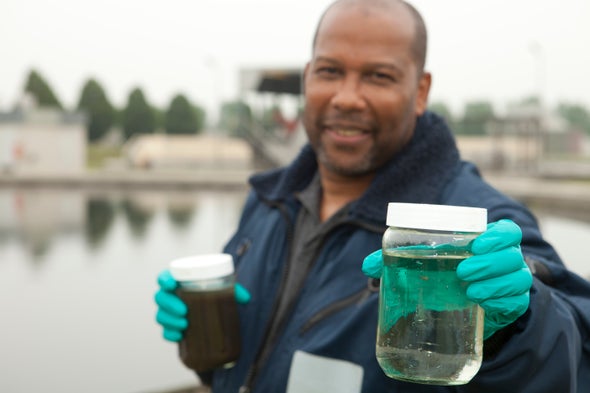(单词翻译:单击)
听力文本
This is Scientific American's 60-second Science, I'm Susanne Bard.
Would you drink water that had once been flushed down a toilet? After it's been cleaned, that is. The climate is warming, and the population of drought-prone states like California continues to grow. So recycling wastewater into drinking water may become a necessity. But:
"People are grossed out by recycled water, because it as was once wastewater—you know, the stuff that goes down your kitchen drains, your showers, your toilets. And even though it's cleaned up to a standard that is identical, if not better, than commercially bottled water, the key barrier to recycled water acceptance is people's disgust regarding it."
University of California, Riverside, psychologist Daniel Harmon. In a recent set of experiments, Harmon and his colleague Mary Gauvain learned just how difficult it can be for people to get over their disgust at the thought of drinking recycled water.
"Our study was aimed at investigating whether the media messages that we see—you know, commercials or brief Internet videos; these pro-environmental messages—whether they actually work. Whether they can get people to accept recycled water and consume recycled water."

In one experiment, the researchers had some participants watch a short video promoting water conservation. And in another experiment, they added a video explaining why recycled water might trigger disgust, even though all contaminants have been removed. And neither video had a strong effect on people's willingness to drink recycled water or to sign a petition supporting the practice.
"The messages did sort of make people more positively predisposed to recycled water, but it was not enough to get them to actually use recycled water more. It didn't actually translate to behaviors."
In fact, viewing the video that directly addressed recycled water's "ick" factor was no more persuasive than the water conservation video alone. Perhaps because dispassionate reason and logic only go so far.
"Disgust is such a powerful core reaction. It's such a powerful emotion that simply giving more information is not going to really be effective because disgust is not really a rational response."
The study appears in the journal Basic and Applied Social Psychology.
Harmon says it's probably going to take a lot more than just brief Internet messaging to get people to embrace recycled water. For example, it might help to see members of their community drinking water that's gone, as it's called, from "toilet to tap," with no ill effects.
"We think that these kind of more direct campaigns for acceptance are necessary to get people to get over that hump—to take that first sip, so to speak."
Cheers!
Thanks for listening for Scientific American's 60-second Science. I'm Susanne Bard.
参考译文
这里是科学美国人——60秒科学系列,我是苏珊娜·巴德。
你会喝曾经冲马桶的水吗?也就是经过清理过滤的水。气候在变暖,而且加州等易发干旱的州的人口数量在持续增加。因此,回收废水变成饮用水可能会成为必须。但是:
“人们对循环水感到恶心,因为它以前是废水,是流进厨房下水道、浴室和厕所的东西。即便将其清洁到就算不优于但也等同于商业瓶装水的标准,但接受循环水的关键阻碍仍是人们对其的厌恶。”
加州大学河滨分校的心理学家丹尼尔·哈蒙说到。在最近的一组实验中,哈蒙及其同事玛丽·高文了解到,人们想到喝循环水时,有多难以克服恶心感。
“我们的研究旨在调查商业宣传或网络短视频等媒体信息,调查这些支持环保的信息是否真的有效。是否能让人们接受和消费再生水。”
在一项实验中,研究人员让一些参与者观看宣传保护水资源的短片。在另一项实验中,他们增加了一段视频,该视频解释了即使所有污染物都被清除,循环水仍会让人厌恶的原因。这两个视频都未对人们饮用循环水或签署支持该行为的请愿书的意愿产生太大影响。
“这些信息确实让人们对循环水的看法更正面,但这并不足以让他们更多地使用循环水。信息并未真正转化为行动。”
事实上,观看直指循环水“恶心”因素的视频,并不比单独看保护水资源的视频更有说服力。也许是因为冷静的理性和逻辑只能走这么远。
“厌恶是如此强大的核心反应。厌恶是种强烈的情绪,只会释放更多没有实际作用的信息,因为厌恶并不是真正的理性反应。”
这项研究发表在《基础与应用社会心理学》期刊上。
哈蒙说,要让人们接受循环水,所需的可能比简短的网络信息要多得多。比如,信息有助于见证社区成员喝用过的水,也是就从“厕所到水龙头”的水,而不会产生负面影响。
“我们认为,为了让人们克服障碍、喝上第一口循环水,进行这种更直接的争取接受的运动很有必要。”
干杯!
谢谢大家收听科学美国人——60秒科学。我是苏珊娜·巴德。
译文为可可英语翻译,未经授权请勿转载!
重点讲解
重点讲解:
1. gross out 使人恶心;令人憎恶;令人作呕;
His bad breath really grossed me out.
他的口臭实在使我恶心。
2. clean up 清理,清除(污染物);
Under pressure from the public, many regional governments cleaned up their beaches.
迫于公众压力,许多地区政府对各自海滩进行了清理。
3. get over 克服,战胜(问题、困难);
She can't get over her shyness.
她无法克服羞怯心理。
4. even though 即使;尽管;纵然;
Even though I'm quite a reserved person, I like meeting people.
我虽然性格极为内敛,但喜欢和人接触。


